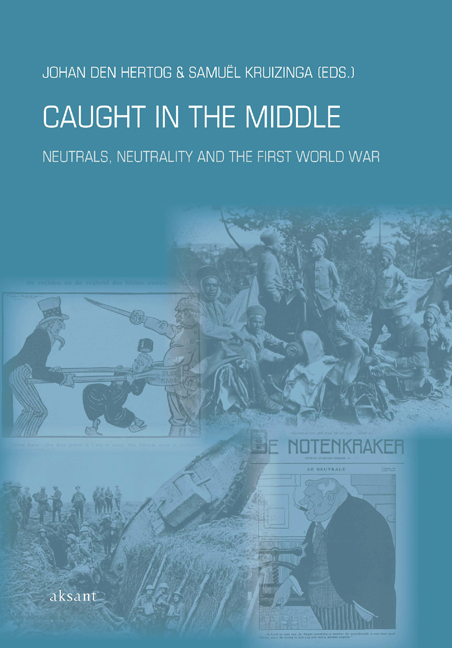Book contents
- Frontmatter
- Contents
- Acknowledgements
- Chapter 1 Introduction
- Chapter 2 Dutch Neutrality and the Value of Legal Argumentation
- Chapter 3 ‘Upon the Neutral Rests the Trusteeship of International Law’: Legal advisers and American unneutrality
- Chapter 4 Spanish Neutrality During the First World War
- Chapter 5 Britain’s Global War and Argentine Neutrality
- Chapter 6 NOT Neutrality: The Dutch government, the Netherlands Oversea Trust Company, and the Entente blockade of Germany, 1914-1918
- Chapter 7 From Parasite to Angel: Narratives of neutrality in the Swedish popular press during the First World War
- Chapter 8 Colour-blind or Clear-sighted Neutrality?: Georg Brandes and the First World War
- Chapter 9 The Hottest Places in Hell?: Finnish and Nordic neutrality from the perspective of French foreign policy, 1900-1940
- Chapter 10 The Other End of Neutrality: The First World War, the League of Nations, and Danish neutrality
- About the Contributors
Chapter 6 - NOT Neutrality: The Dutch government, the Netherlands Oversea Trust Company, and the Entente blockade of Germany, 1914-1918
Published online by Cambridge University Press: 28 January 2021
- Frontmatter
- Contents
- Acknowledgements
- Chapter 1 Introduction
- Chapter 2 Dutch Neutrality and the Value of Legal Argumentation
- Chapter 3 ‘Upon the Neutral Rests the Trusteeship of International Law’: Legal advisers and American unneutrality
- Chapter 4 Spanish Neutrality During the First World War
- Chapter 5 Britain’s Global War and Argentine Neutrality
- Chapter 6 NOT Neutrality: The Dutch government, the Netherlands Oversea Trust Company, and the Entente blockade of Germany, 1914-1918
- Chapter 7 From Parasite to Angel: Narratives of neutrality in the Swedish popular press during the First World War
- Chapter 8 Colour-blind or Clear-sighted Neutrality?: Georg Brandes and the First World War
- Chapter 9 The Hottest Places in Hell?: Finnish and Nordic neutrality from the perspective of French foreign policy, 1900-1940
- Chapter 10 The Other End of Neutrality: The First World War, the League of Nations, and Danish neutrality
- About the Contributors
Summary
From the second half of the nineteenth century, Dutch international politics and economics moved in opposing directions. Politically, the Netherlands pursued a course of strict neutrality, its leaders deciding that this was the only politically realistic option open to them which would safeguard both their European homeland and their vast Asian colonial possessions from the jealous eyes of the surrounding Great Powers. Dutch foreign policy before the First World War therefore consisted, in the words of one contemporary observer, of being decent neighbours to all of its neighbours, but good friends with none of them. Dutch attempts to stay aloof from European power politics contrast sharply, however, with its active participation in the pre-1914 global world economy.
Importing massive amounts of foodstuffs, feeding stuffs and fodder from the Americas, the Dutch agricultural sector was heavily geared towards export. The most important market for Dutch vegetables, meat and dairy products was Britain, after the German market had been closed to the Dutch due to a series of protective tariffs. But Holland was not just an agricultural powerhouse; its economy was quite varied, especially for a country so small in size. The river Rhine, which linked the German Ruhr industrial basin with the North Sea, allowed the Netherlands to become a trading hub, and Rotterdam the gateway to Central Europe. The 1868 Rhine Shipping Treaty between the Netherlands and Germany cemented the symbiotic relationship between Rotterdam and Ruhr, by eliminating all tariffs on the river Rhine and making all transit trade to and from the North Sea via the Netherlands permanently ‘free’ from government interference. The Netherlands East Indies were an important source of trade as well. From 1904 onwards, prices of Indies goods on the world market rose, production expanded and investment returns were very high. Amsterdam became a staple market for Indies goods such as sugar and tobacco, and a host of new trading houses and industries was set up to pack, distribute and / or process the colonial goods, often for re-export to another country. The Dutch had experienced a slow industrialisation process, but by the early twentieth century, the pace had quickened.
- Type
- Chapter
- Information
- Caught in the MiddleNeutrals, Neutrality and the First World War, pp. 85 - 104Publisher: Amsterdam University PressPrint publication year: 2012



